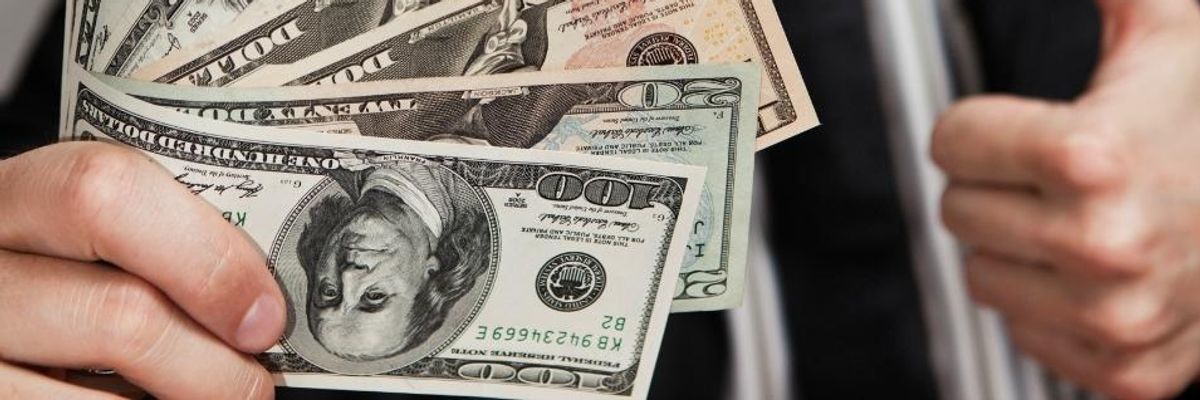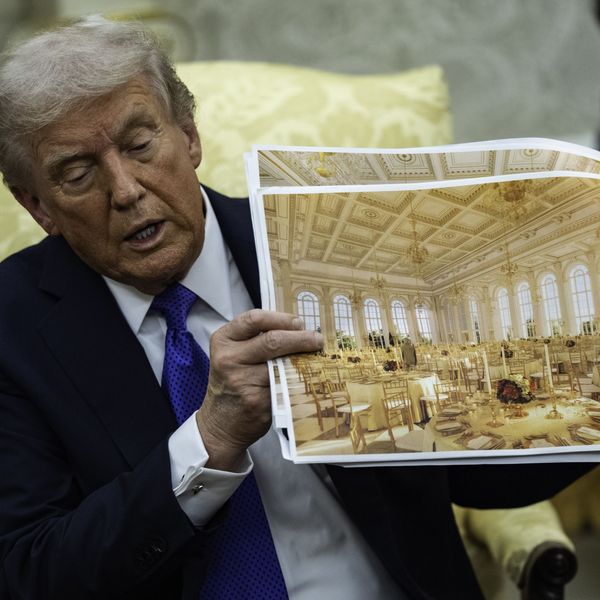
Voters should know where the cash for campaign ads comes from, says Public Citizen, but the FEC's interpretation of regulations is blocking that transparency. (Photo: Tax Credits/flickr/cc)
FEC Called On to Close Dark Money Loophole Poisoning Democracy
"Dark money has become a scourge in our elections," says Public Citizen's Lisa Gilbert
An advocacy group called on the Federal Election Commission (FEC) on Monday to fix its interpretation of a rule that has helped dark money flourish.
At issue, says Washington, D.C.-based Public Citizen, is the federal agency wrongful reading of donor disclosure requirements for independent expenditures, or spending for or against a particular candidate. The agency also erred in its interpretation of the donor disclosure regulation for electioneering communications--ads for or against a political candidate that appear just ahead of an election.
By asserting that only "earmarked contributions" for those expenditures require disclosure, the agency created a loophole that effectively gutted full transparency of the sources of donations.
"No one earmarks their campaign contributions for a specific purpose," said Craig Holman, government affairs lobbyist for the organization's Congress Watch division. "Donors give money to campaigns and expect it to be used for campaign purposes."
In its letter (pdf) to the FEC, Public Citizen noted:
Among groups making independent expenditures (expenditures expressly intended to influence elections) disclosure of donors fell from 90 percent in 2004 and 97 percent in 2006 to only 70 percent in 2010. Notably, the only groups that could withhold information about their funders in the past were "qualified non-profits," groups that have no business purpose and receive their funding exclusively from individuals. No such assurance exists for the independent expenditures groups that concealed their donors in 2010.
That was the year the Supreme Court issued its Citizens United ruling, which opened the floodgates to dark money spending.
The letter also provides data from the Center for Responsive Politics showing the surge of this secretive spending in federal elections over the past decade:
| Election Cycle | Total Dark Money |
| 2002 | $4 million |
| 2004 | $6 million |
| 2006 | $5 million |
| 2008 | $102 million |
| 2010 | $139 million |
| 2012 | $313 million |
| 2014 | $178 million |
| 2016 | $184 million |
| 2018 | $148 million |
"Dark money has become a scourge in our elections, allowing nondescript groups to raise and spend huge sums of corporate and special interest money for campaign ads, while refusing to tell the public who is paying to influence their vote," said Lisa Gilbert, vice president of legislative affairs for Public Citizen. "Knowing where the money comes from is a valuable voter's cue in judging the merit of the message."
An Urgent Message From Our Co-Founder
Dear Common Dreams reader, The U.S. is on a fast track to authoritarianism like nothing I've ever seen. Meanwhile, corporate news outlets are utterly capitulating to Trump, twisting their coverage to avoid drawing his ire while lining up to stuff cash in his pockets. That's why I believe that Common Dreams is doing the best and most consequential reporting that we've ever done. Our small but mighty team is a progressive reporting powerhouse, covering the news every day that the corporate media never will. Our mission has always been simple: To inform. To inspire. And to ignite change for the common good. Now here's the key piece that I want all our readers to understand: None of this would be possible without your financial support. That's not just some fundraising cliche. It's the absolute and literal truth. We don't accept corporate advertising and never will. We don't have a paywall because we don't think people should be blocked from critical news based on their ability to pay. Everything we do is funded by the donations of readers like you. Will you donate now to help power the nonprofit, independent reporting of Common Dreams? Thank you for being a vital member of our community. Together, we can keep independent journalism alive when it’s needed most. - Craig Brown, Co-founder |
An advocacy group called on the Federal Election Commission (FEC) on Monday to fix its interpretation of a rule that has helped dark money flourish.
At issue, says Washington, D.C.-based Public Citizen, is the federal agency wrongful reading of donor disclosure requirements for independent expenditures, or spending for or against a particular candidate. The agency also erred in its interpretation of the donor disclosure regulation for electioneering communications--ads for or against a political candidate that appear just ahead of an election.
By asserting that only "earmarked contributions" for those expenditures require disclosure, the agency created a loophole that effectively gutted full transparency of the sources of donations.
"No one earmarks their campaign contributions for a specific purpose," said Craig Holman, government affairs lobbyist for the organization's Congress Watch division. "Donors give money to campaigns and expect it to be used for campaign purposes."
In its letter (pdf) to the FEC, Public Citizen noted:
Among groups making independent expenditures (expenditures expressly intended to influence elections) disclosure of donors fell from 90 percent in 2004 and 97 percent in 2006 to only 70 percent in 2010. Notably, the only groups that could withhold information about their funders in the past were "qualified non-profits," groups that have no business purpose and receive their funding exclusively from individuals. No such assurance exists for the independent expenditures groups that concealed their donors in 2010.
That was the year the Supreme Court issued its Citizens United ruling, which opened the floodgates to dark money spending.
The letter also provides data from the Center for Responsive Politics showing the surge of this secretive spending in federal elections over the past decade:
| Election Cycle | Total Dark Money |
| 2002 | $4 million |
| 2004 | $6 million |
| 2006 | $5 million |
| 2008 | $102 million |
| 2010 | $139 million |
| 2012 | $313 million |
| 2014 | $178 million |
| 2016 | $184 million |
| 2018 | $148 million |
"Dark money has become a scourge in our elections, allowing nondescript groups to raise and spend huge sums of corporate and special interest money for campaign ads, while refusing to tell the public who is paying to influence their vote," said Lisa Gilbert, vice president of legislative affairs for Public Citizen. "Knowing where the money comes from is a valuable voter's cue in judging the merit of the message."
An advocacy group called on the Federal Election Commission (FEC) on Monday to fix its interpretation of a rule that has helped dark money flourish.
At issue, says Washington, D.C.-based Public Citizen, is the federal agency wrongful reading of donor disclosure requirements for independent expenditures, or spending for or against a particular candidate. The agency also erred in its interpretation of the donor disclosure regulation for electioneering communications--ads for or against a political candidate that appear just ahead of an election.
By asserting that only "earmarked contributions" for those expenditures require disclosure, the agency created a loophole that effectively gutted full transparency of the sources of donations.
"No one earmarks their campaign contributions for a specific purpose," said Craig Holman, government affairs lobbyist for the organization's Congress Watch division. "Donors give money to campaigns and expect it to be used for campaign purposes."
In its letter (pdf) to the FEC, Public Citizen noted:
Among groups making independent expenditures (expenditures expressly intended to influence elections) disclosure of donors fell from 90 percent in 2004 and 97 percent in 2006 to only 70 percent in 2010. Notably, the only groups that could withhold information about their funders in the past were "qualified non-profits," groups that have no business purpose and receive their funding exclusively from individuals. No such assurance exists for the independent expenditures groups that concealed their donors in 2010.
That was the year the Supreme Court issued its Citizens United ruling, which opened the floodgates to dark money spending.
The letter also provides data from the Center for Responsive Politics showing the surge of this secretive spending in federal elections over the past decade:
| Election Cycle | Total Dark Money |
| 2002 | $4 million |
| 2004 | $6 million |
| 2006 | $5 million |
| 2008 | $102 million |
| 2010 | $139 million |
| 2012 | $313 million |
| 2014 | $178 million |
| 2016 | $184 million |
| 2018 | $148 million |
"Dark money has become a scourge in our elections, allowing nondescript groups to raise and spend huge sums of corporate and special interest money for campaign ads, while refusing to tell the public who is paying to influence their vote," said Lisa Gilbert, vice president of legislative affairs for Public Citizen. "Knowing where the money comes from is a valuable voter's cue in judging the merit of the message."

